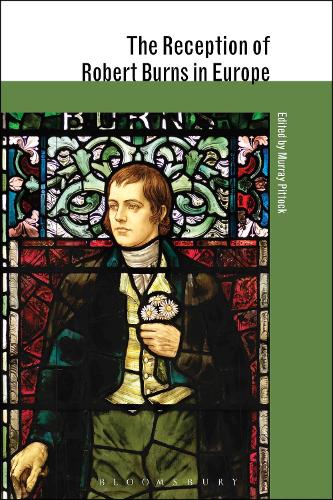
The Reception of Robert Burns in Europe
(Hardback)
Publishing Details
The Reception of Robert Burns in Europe
By (Author) Professor Murray Pittock
Bloomsbury Publishing PLC
Bloomsbury Academic USA
19th June 2014
United States
Classifications
Tertiary Education
Non Fiction
821.6
Physical Properties
Hardback
416
Width 156mm, Height 234mm
755g
Description
Robert Burns (1759 1796), Scotlands national poet and pioneer of the Romantic Movement, has been hugely influential across Europe and indeed throughout the world. Burns has been translated seven times as often as Byron, with 21 Norwegian translations alone recorded since 1990; he was translated into German before the end of his short life, and was of key importance in the vernacular politics of central and Eastern Europe in the nineteenth century. This collection of essays by leading international scholars and translators traces the cultural impact of Burns' work across Europe and includes bibliographies of major translations of his work in each country covered, as well as a publication history and timeline of his reception on the continent.
Reviews
In her preface to this book, Elinor Shaffer (editor of the series in which the book appears) argues that translation histories show the complex interweaving of ideas, periods, and peoples and illuminate an author by refracting unexpected attributes in texts one takes for granted. The 14 critics assembled by Pittock (Univ. of Glasgow, Scotland)among them Silvia Mergenthal, Francesca Saggini, Marjorie Rycroft, Natalia Kaloh Vid, and Frauke Reitemeierbring to this volume a broad expanse of knowledge, location, and focus and in so doing weave a fascinating critical tapestry. Anchored by a timeline of translations (17982012), the volume tracks reception all over Europe and into music, revealing the unexpected at every turn. Burnss work contributed to the development of nationalism, picking up on the influence of Ossian. But at times it failed to connect or found a space (e.g., Spain) already occupied by Sir Walter Scott. In France, Burnss reputation soared and dived. Elsewhere (Germany and Switzerland), it engaged sporadically, according to the surge in ideas or familiarity with dialects. Russia claimed itself as the only country that understood him; in Austria, Burns's work was once restricted to reliable citizens. Burns, it seems, lives dangerouslyand always interestinglyabroad. An excellent resource. Summing Up: Highly recommended. Graduate students, researchers, faculty. * C. McCracken-Flesher, in CHOICE *
Author Bio
Murray Pittock is Bradley Professor of English Literature at the University of Glasgow, a Fellow of the Royal Society of Edinburgh, and a prizewinner of that society and of the British Academy, as well as winning or being nominated or shortlisted for over ten other literary prizes. He is the author or editor of a number of prominent works on Jacobitism and Romanticism, including Scottish and Irish Romanticism (2008, 2011), Robert Burns in Global Culture (2011) and Material Culture and Sedition: Treacherous, Objects, Secret Places (2013). He is currently editing the Scots Musical Museum in the AHRC Collected Burns edition.
